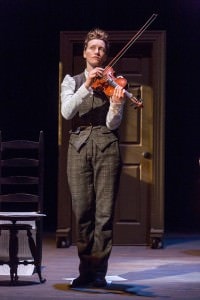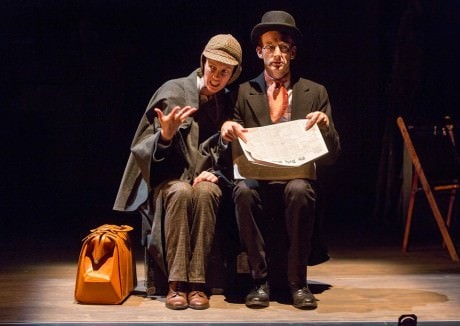As I walked into the bustling lobby of the Hylton Performing Arts Center to see the professional touring company Aquila Theatre’s fantastic new production of The Adventures of Sherlock Holmes, I couldn’t help but smile at the refreshing change of pace I was about to experience. After being recently inundated with shows from across the city participating in the Women’s Voices Theatre Festival, here was going to be some good old-fashioned stagecraft devoid of any dense or heady disruptions of gender and sexuality that have been so effectively advanced by the shows in the Festival I have seen so far.

And yet, as the lights dimly rose and Sherlock stepped forward, playing sweet violin notes, I noticed something different about this Holmes; what was the actor’s name again? Loren O’Dair? Loren is one of those old British lordly names like Lindsey or Alex, right? But then O’Dair began to speak with a whip-smart inflection that draws ones attention like an electric magnet, and the casting choice became clear. Yes, Sherlock is a woman in Aquila’s new production – and I would not receive my expected respite from a hornet’s nest of gendered possibilities on stage after all. When all was said and done, I wouldn’t have had it any other way. Aquila mounts a slick, fast-paced, and highly entertaining rendition of that old sleuth from Baker Street – and proves once again (as if we weren’t already learning fast in DC) that gender norms, when they are overturned on stage, make for some intriguing and refreshing performance.
The genius behind Director Desiree Sanchez’s production is that it is simultaneously old and new; an almost unusually faithful rendition of three of Sir Arthur Conan Doyle’s original stories combined with an ice cold modern staging that incorporates elements of smoky film noir as well as laugh-out-loud physical comedy. Both the ingeniously mobile set by Alberto Segarra and the luscious costumes by Clare Amos are firmly grounded in the Victorian era. And yet the almost spartan set and the fashion-forward touches on the costumes also lift the story out of its original context, tilting the source material just enough to offer an engagingly fresh perspective. The lighting design by Alberto Segarra is skeletal (to the point of being under-lit in a few moments), making ample use of side lighting and roving spots to create an almost lonely stagescape that is all shadows and contrast that is far from the 19th century land of brightly lit drawing rooms.
But of course it is the choice to cast Loren O’Dair as the Sleuth herself that is the boldest and most modernizing choice. I should emphasize that regardless of her gender O’Dair is a powerhouse presence on stage who conveys the infinity of, in equal parts, genius and condescension that make Sherlock Holmes such a complex and endearing character. Her excellent violin skills as she plays original music by Composer Joe Louis Robinson is also a joy to listen to. And yet the fact of her gender brings into even starker relief how unusual Sherlock Holmes is in this world of non-observant peasants, and her flagrant disavowal of 19th century gender customs becomes an additional layer of awesome-ness to lay on top of this already compelling character.
Desiree Sanchez is clear in making Sherlock a woman. The pronouns used to describe her are always feminine, and in one early scene Dr. Watson claims that “a few centuries ago they would have burned you as a witch.” Yet Holmes is hardly clad in the corsets and bustling skirts so characteristic of bourgeois ladies in that era: she is in a shirt and vest that flattens her front, and in baggy men’s trousers that one can only assume she uses when manspreading on the train. She is a woman in a man’s world, beating all the men at their own game. It is both good politics and good theatre to watch.

O’Dair is complemented by a small but mighty ensemble of four cast mates: Peter Groom as the prim and lovable Dr. Watson, who delivers probably the funniest bit of business when he transforms himself into a stomping, snorting horse during the third act; Kirsten Foster, upon whom it falls to play the ingénues in the three pieces, including the intriguing Irene Adler, the “only woman who is Sherlock’s intellectual equal” in yet another provoking display of gender-baiting; and Hemi Yeroham who is hilarious in all the roles he plays, particularly as the cane-wielding King of Bohemia. All of the actors switch seamlessly between roles and move set pieces here and there with balletic ease.
The crisp staging and spot-on execution helps to keep the pace at a high clip throughout, essential to the show’s “game is afoot!” adventurous energy. The actors are all also very adept at physical comedy, such as when Peter Groom bangs on the typewriter in a ridiculous send-up of his character’s incessant writing, or when Hemi Yeroham makes a full revolution around his cane before strutting out the door of Sherlock’s office as the King of Bohemia. And Michael Rivers plays a dashing heroic figure as well as a few hilarious crones in drag, proving the elasticity of the ensembles abilities.
With a text that is so dependent on recounted stories and intricate narratives, this physical dimension is critical to making these stories work on stage.
In fact, Sherlock Holmes could benefit most from an expansion of these alternative means of storytelling. In a few moments the show attempts to tell key parts of stories using rudimentary animation in its projections, designed by Ellie Engstrom. The projections are the sole weak spot of an otherwise compelling design, oddly discordant with the rest of the set and usually more confusing than illuminating. However, the impulse to transform a wordy text into dramatic stage action is admirable.
Sherlock Holmes seems to be having a moment in America. The growing popularity of the modernized BBC television show along with the presence of yet another touring production slated to play at the Warner in a few weeks testifies to the continuing appeal of the master detective in the funny hat. Aquila succeeds by making something old very new again, and it is no mystery why the result is a heart-racing joy to behold.
Running Time: Two and a half hours, with one 15-minute intermission.
The Adventures of Sherlock Holmes played for one night only at Aquila Theatre, performing at the Hylton Performing Arts Center at George Mason University – 10960 George Mason Circle, in Manassas, VA.
Aquila’s Romeo & Juliet can be seen for one night only TONIGHT Sunday, October 1, 2015 at George Mason University’s Center for the Arts in Fairfax, Virginia. For tickets, call the box office at (888) 945-2468, or purchase them online.



![Aquila - Romeo&Juliet_Web_728x90[2]](https://dctheaterarts.org/wp-content/uploads/2015/09/Aquila-RomeoJuliet_Web_728x902.jpg)


